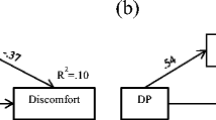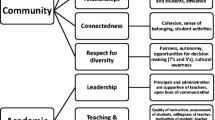Abstract
This mixed methods study examines how college students’ perceptions and experiences affect their understanding of academic integrity. Using qualitative and quantitative responses from the Personal and Social Responsibility Institutional Inventory (PSRI), both quantitative and qualitative results demonstrate that while campuses may see a reduction in overall levels of cheating when punitive academic integrity policies are present, students may develop higher levels of personal and academic integrity through the use of more holistic and community-focused practices.
Similar content being viewed by others
References
AAC&U. Association of American Colleges and Universities (2006). Core commitments: educating students for personal and social responsibility. Retrieved from http://www.aacu.org/core_commitments/documents/brochure.pdf.
Astin, A. W. (1984). Student involvement: A developmental theory for higher education. Journal of College Student Personnel, 25(4), 297–308.
Astin, A. W. (1993). What matters in college: Four critical years revisited. San Francisco: Jossey Bass.
Baird, J. S. (1980). Current trends in college cheating. Psychology in the Schools, 17, 515–522.
Barnhardt, C., Antonaros, M., Holsapple, M. A, Ott, M. C, & Dey, E. L. (2010) The PRSI technical guide. Retrieved from http://www.psri.hs.iastate.edu/documents/TechnicalandAdministrativeGuide2010.pdf.
Barnhardt, C., Sheets, J. E., & Pasquesi, K. (2015). You expect what? Students’ perceptions as resources in acquiring commitments and capacities for civic engagement. Research in Higher Education, 56(6), 622–644.
Barret, D. (2011). The cheating epidemic at Britain’s universities. The telegraph. http://www.telegraph.co.uk/education/educationnews/8363345/The-cheating-epidemic-at-Britains-universities.html.
Bengali, S. (2015). India test cheating stirs outrage--then people start dying. Los Angeles Times. Retrieved from http://www.latimes.com/world/great-reads/la-fg-c1-india-testing-scam-20150717-story.html.
Bolman, L. G., & Deal, T. E. (1997). Reframing organizations: Artistry, choice, and leadership (2nd ed.). San Francisco: Jossey-Bass.
Bowers, W. J. (1964). Student dishonesty and its control in college. New York: Bureau of Applied Social Research, Columbia University.
Bronfenbrenner, U. (1979). The ecology of human development: Experiments by nature and design. Cambridge: Harvard University Press.
Buchmann, B. (2014). Cheating in college: where it happens, why students do it and how to stop it. Retrieved from http://www.huffingtonpost.com/uloop/cheating-in-college-where_b_4826136.html.
Burr, V., & King, N. (2012). You’re in cruel England now!’: Teaching research ethics through reality television. Psychology Learning and Teaching, 11, 22–29.
Creswell, J. (2013). Qualitative inquiry and research design: Choosing among five traditions (3rd ed.). Thousand Oaks: SAGE Publications.
Creswell, J., & Plano Clark, V. L. (2011). Designing and conducting mixed methods research (2nd ed.). Thousand Oaks: SAGE Publications.
Curtis, G. J., & Clare, J. (2017). How prevalent is contract cheating and to what extent are students repeat offenders? Journal of Academic Ethics, 15(2), 115–124.
Curtis, G. J., & Vardanega, L. (2016). Is plagiarism changing over time? A 10-year time-lag study with three points of measurement. Higher Education Research and Development, 35(6), 1167–1179.
East, J., & Donnelly, L. (2012). Taking responsibility for academic integrity: A collaborative teaching andlearning design. Journal of University Teaching and Learning Practice, 9(3), 2.
Franklyn-Stokes, A., & Newstead, S. E. (1995). Undergraduate cheating: who does what and why? Studies in Higher Education, 20(2), 159–172.
Gallant, T., & Drinan, P. (2006). Organizational theory and student cheating: Explanation, responses, and strategies. Journal of Higher Education, 77(5), 846–847.
Glaser, B. G., & Strauss, A. L. (1999). The discovery of grounded theory: Strategies for qualitative research. New Brunswick: Aldine Transaction.
Gynnild, V., & Gotschalk, P. (2008). Promoting academic integrity at a Midwestern university: Critical review and current challenges. International Journal for Educational Integrity, 4, 41–59.
Kibler, W. L. (1993). Student cheating: A student development dilemma. NASPA Journal, 30(4), 252–267.
Kohlberg, L. (1981). The philosophy of moral development: Moral stages and the idea of justice, essays on moral development (Vol. 1). San Francisco: Harper and Row Publishers.
Laker, J., Mrnjaus, K., & Naval, C. (Eds.). (2014). Palgrave studies in global citizenship education and democracy: Citizenship, democracy and higher education in Europe, Canada, and the United States. Basingstoke: Palgrave Macmillan.
Löfström, E., Trotman, T., Furnari, M., & Shephard, K. (2015). Who teaches academic integrity and how do they teach it? Higher Education, 69, 435–448.
Long, J. S. (1997). Regression models for categorical and limited dependent variables. Thousand Oaks: Sage Publications, Inc..
Long, J. S., & Freese, J. (2006). Regression models for categorical dependent variables using Stata (2nd ed.). College Station: Stata Press.
McCabe, D. L. (1999). Academic dishonesty among high school students. Adolescence, 34, 681–687.
McCabe, D. L., & Trevino, L. K. (1993). Academic dishonesty: Honor codes and other contextual influences. Journal of Higher Education, 64, 522–538.
McCabe, D. L., & Trevino, L. K. (1996, January/February). What we know about cheating in college: Longitudinal trends and recent developments. Change, 28(1), 29–33.
McCabe, D. L., & Trevino, L. K. (1997). Individual and contextual influences on academic dishonesty: A multicampus investigation. Research in Higher Education, 38(2), 379–396.
McCabe, D. L., & Trevino, L. K. (2002). Honesty and honor codes. Academe, 88(1), 37–41.
McCabe, D. L., Butterfield, K. D., & Trevino, L. K. (2012). Cheating in college: Why students do it and what 633 educators can do about it. Baltimore: Johns Hopkins Press.
Morse, J. M. (1991). Approaches to qualitative-quantitative methodological triangulation. Nursing Research, 40, 120–123.
Morse, J. M., & Niehaus, L. (2009). Principles and procedures of mixed methods design. Walnut Creek, CA: Left Coast Press.
Owens, C., & White, F. A. (2013). A 5-year systematic strategy to reduce plagiarism among first-year psychology university students. Australian Journal of Psychology, 65(1), 14–21.
Pascarella, E. T., & Terenzini, P. T. (2005). How college affects students: A third decade of research (Vol. 2). San Fransico: Jossey-Bass.
Patton, M. (1990). Qualitative evaluation and research methods. Beverly Hills: SAGE Publications.
Pérez-Peña, R. (2013). Students disciplined in Harvard scandal. The New York Times. Retrieved from http://www.nytimes.com/2013/02/02/education/harvard-forced-dozens-to-leave-in-cheating-scandal.html?_r=0.
Peterson, M. W., & Spencer, M. G. (1990). Understanding academic culture and climate. New Directions for Institutional Research, 68, 3–18.
Reason, R. D. (Ed.). (2013). Special issue: Developing and assessing personal and social responsibility incollege. New Directions for Higher Education (Vol. 164). Hoboken: Wiley Periodicals, Inc.
Reid, L. D., & Radhakrishnan, P. (2003). Race matters: The relation between race and general campus climate. Cultural Diversity and Ethnic Minority Psychology, 9(3), 263–275.
Strauss, A., & Corbin, J. (1998). Basics of qualitative research (2nd ed.). Thousand Oaks: Sage.
Strayhorn, T. L. (2012). College students’ sense of belonging: A key to educational success for all students. New York: Routledge.
Swaner, L. E. (2004). Educating for personal and social responsibility: A planning project of the Association of American Col- leges and Universities. Washington, DC: Association of American Colleges & Universities.
True, G., Alexander, L. B., & Richman, K. A. (2011). Misbehaviors of front-line research personnel and the integrity of community-based research. Journal of Empirical Research on Human Research Ethics, 6, 3–12.
Acknowledgements
The authors are grateful to the Association of American Colleges and Universities for providing access to the Core Commitments data.
Funding
The John Templeton Foundation and the Association of American Colleges and Universities supported data collection in 2006–2007. The authors of this manuscript did not receive any funding to support this project.
Author information
Authors and Affiliations
Corresponding author
Ethics declarations
Conflict of Interest
The authors declare that they have no conflicts of interest.
Human Subjects
The authors of this study were approved by the Institutional Review Board (IRB) at the University of Iowa to use data as de-identified secondary data (IRB #201210740).
Rights and permissions
About this article
Cite this article
Young, R.L., Miller, G.N.S. & Barnhardt, C.L. From Policies to Principles: The Effects of Campus Climate on Academic Integrity, a Mixed Methods Study. J Acad Ethics 16, 1–17 (2018). https://doi.org/10.1007/s10805-017-9297-7
Published:
Issue Date:
DOI: https://doi.org/10.1007/s10805-017-9297-7




